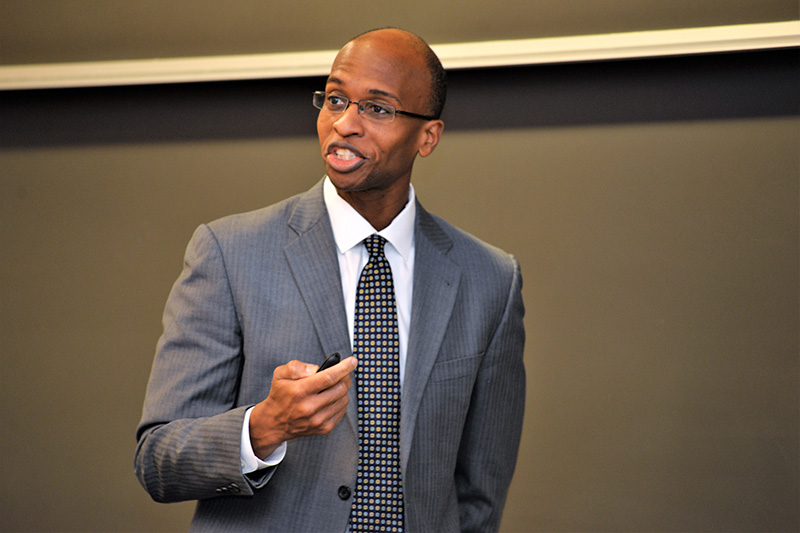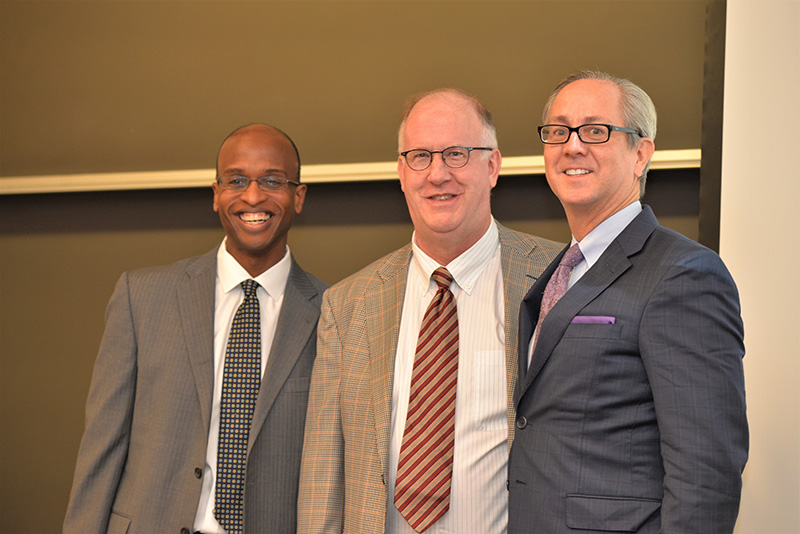 DBA candidate Brian Thompson
DBA candidate Brian ThompsonFor Brian Thompson, understanding and interpreting the research behind how the market works is key to helping both his clients and his students make well-informed investment decisions.
Thompson manages his own investment advisory business, teaches finance and economic courses as an adjunct business professor at DePaul University, and also is a student in
DePaul’s Doctorate in Business Administration (DBA) program, where he is gaining advanced skills for turning business research into actionable insights.
This summer, Thompson will present a research paper at the Behavioral Finance Working Group Conference hosted by the Queen Mary University of London. Thompson co-authored the paper with DBA candidates Erik Davidson and David Stubing as part of a project milestone in DePaul’s DBA program.
The Kellstadt Graduate School of Business launched the part-time, three-year DBA program in fall 2015 to empower experience professionals like Thompson to take their careers to the next level. The program targets executives who want to enhance their research acumen to discover new solutions for business problems, as well as experienced business professionals who want to enter academia.
The program challenges candidates to complete a year-long research project with three to four team members from their class cohort. Using the skills they’ve gained from coursework in research methods and statistics, each team is tasked with developing a thesis that solves a real-world business problem with the help of an experienced business faculty advisor.
Learn more about the DBA program
Thompson’s research paper “Does Investor Sentiment Affect Market Response to Earnings Restatements?” found that if investors feel good about the market, they are less likely to be worried when companies restate their earnings.
As a principal of an investment advisory business, Thompson, who is in the
Class of 2019 DBA cohort, says his experience in developing and completing original research allows him to gain credibility and have more informed discussions with clients.
“I think in terms of the research project itself, it also grounds the discussions I have in my classes at DePaul,” he says. “It makes (my discussions) stronger because now I can speak to things from a more informed perspective.”
Solving Complex Business Problems Through Research
After a year of working on research, the DBA student teams discussed their projects during formal presentations to DBA faculty and other cohorts within the program. DBA Program Director Bob Rubin, a DePaul management professor and business consultant, met with the group to discuss feedback submitted by audience members following the presentation.
 DBA candidates from left to right: Brian Thompson, Dave Stubing and Erik Davidson
DBA candidates from left to right: Brian Thompson, Dave Stubing and Erik Davidson
“We’re really committed to student learning in this process,” Rubin says. “Students want to present and publish their papers. But as the program director, my primary concern is that students are learning the research process so that when they get to their dissertation, they really understand the scope of the project and execute it with fewer mistakes and fewer flaws than they would in their first time through.”
Thompson’s group worked with Vahap Uysal, an associate professor of finance, who provided feedback throughout their project and helped facilitate the submission of the team’s paper to the London conference.
For Thompson, one of the biggest challenges of the research project was learning how to work in a team setting, given that DBA candidates are experienced professionals with their own schedules and full-time jobs.
“It’s kind of like building a house,” he says. “There are a lot of different parts to it and you have to specialize in different areas and try to work together to produce the outcome you’re looking for.”
In order to develop a working thesis that provides new insights in the behavioral finance field, Thompson says their faculty advisor emphasized the importance of conducting a thorough literature review.
“That’s the power of having someone who knows what has been done and what hasn’t been done so that you’re not spinning your wheels and doing things that aren’t going to be relevant in the end,” he says.
In addition to taking courses in quantitative and qualitative research, business strategy and organizational development, DBA students use the research project as preparation to reach their own professional goals—whether they want to transition to full-time academia or become business leaders at the highest level in their industries.
“The project starts to extend what they are learning in class in a way that takes them from knowing to doing,” Rubin says. “You learn in class how to set up a research project – what are the key steps you take, what are the decision points you have to make at any given point in the research process, but doing that effectively is an entirely different beast, so we want to give students that hands-on experience to apply what they’re learning in the classroom. We want them to solve real problems that organizations face.”